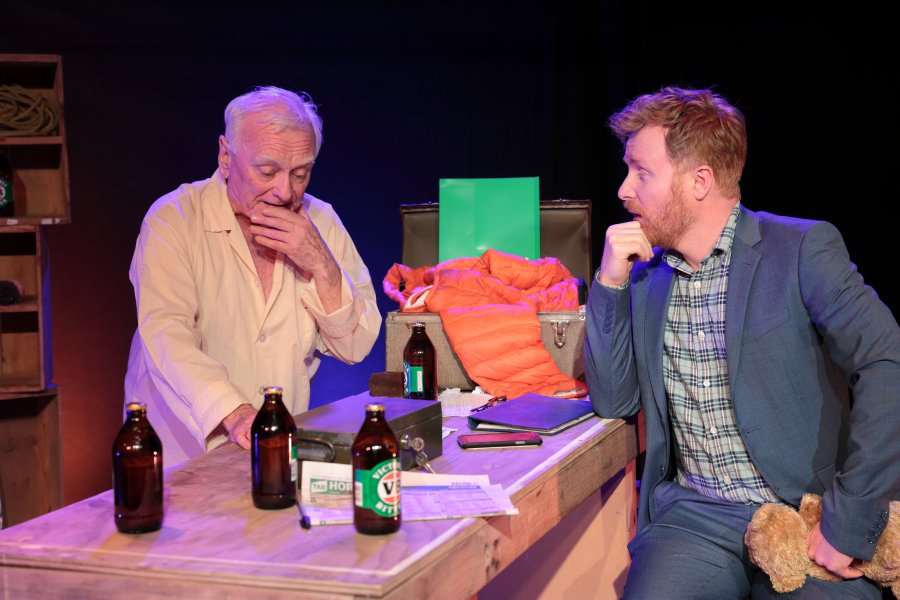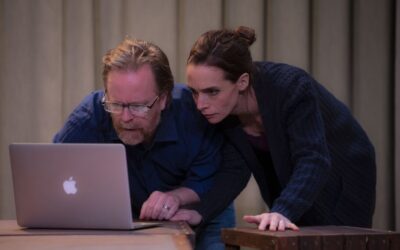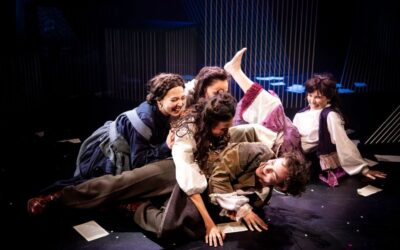By Anna Hayes
The notion of aging is something that we’ve all thought about in one way or another over the years; when you’re young, you hope the bouncer won’t ask for ID, when you get a bit older, you’re flattered when he does…
All jokes aside, aging is a serious topic and I’m not talking about the uber-rich spending millions trying to halt or reverse it (look it up, they’re out there…), but exploring the social impact that people go through.
As an immigrant, living 15,000km away from my septuagenarian parents (my dad won’t like reading that!) there are many moments in Judy Doubas’s ‘Sprouting Wings’ that are confronting as you naturally think about your parents or loved ones getting older; it probably confronts older members of the audience in a very different way.
‘Sprouting Wings’ is a With Attitude production playing at Cracked Actors Theatre until October 15. Best described, to my mind, as a ‘dramedy’, the play has a relatively simple premise – an 84-year-old widower, suffering from dementia, tries to make sense of the world while the people around him, in their own way, try to do what’s best for him.
It’s the central theme of the play in many respects – everyone is trying to do the right thing by one another, they just sometimes cannot see the wood for the trees.
The play opens on Jack, pottering around in his ramshackle shed, which he appears to be living in, drinking VB for breakfast, listening to the radio and trying to find where his cat, Tom, has got to. His morning is interrupted by the arrival of Posy who he initially views as a threat.
From this initial meeting, we learn that Jack has had his driver’s licence rescinded, effectively leaving him on lockdown. He and Posy develop an easy bond, with her offering to check in on him.
We subsequently meet Parrot, Jack’s daughter and heiress to his trucking business. She’s on her third husband, a point that Jack labours frequently, and has been running the business for 20 years with little in the way of financial reward. As things progress, she tries to push her father towards selling his home in favour of a nursing home, as well as pushing a power of attorney agreement.
It would be have been very easy to paint Parrot as a caricature – the greedy kid wheeling and dealing for the family fortune. But her character is always rooted in reality, even if it’s misguided. There is no manual for dealing with family situations like this, and her struggle is equally an internal one.
The father-daughter relationship is well explored as recriminations are traded, catty remarks travel to-and-fro, and family squabbles take centre stage. Jack wants his daughter to bring him to the shops, Parrot wants her own professional autonomy. There are generational clashes – Jack talks about working for pennies in his day while, for Parrot, inflation chomps at her hope for a different life. There are, or have been, sacrifices on both sides.
For Jack, the warm and bubbly Posy presents the ideal that Jack wanted for his daughter – married 25 years with five kids, happy and together. She befriends Jack, offering to help out and later inviting him for dinner with her family.
CAT’s expansive stage lends itself well to the single location of the play, with the creation of the shed using pallets and bric-a-brac wooden shelves and bench. It manages to look both sturdy and ramshackle which fits well as Jack is still relatively sprightly even if his mind is deteriorating. It also provides space for Jack to step outdoors and makes the setting less claustrophobic as a result. It doesn’t seem like the shed is his prison – it feels more like he can’t bear to be in the home without his late wife, Meryl.

Sound plays a big role as Jack’s constant companion is his radio, bleating out some older classics that are expertly picked to tie in with the prevailing mood. Lighting is used effectively, primarily to connote passage of time but also to good effect in the external scenes where green washes give the stage a rich, forest feel.
Director Christine Husband has assembled an excellent ensemble cast here, each bringing their own nuance to the story that unfolds.
Ross Larkin exudes all the shyster qualities of real estate agent, Fletcher Reap. Again, it’s a character that could have leaned into the stereotype, made fun of itself, and slipped away again. But Larkin brings a nice humility to the role. He seems to be forewarned of Jack’s condition but still actively engages, and there are some nice exchanges as the two discuss travel, or the lack thereof.
In her three appearances, Jane Flanagan brings a wonderful warmth to the play; it’s almost as if she is the full stop after each father-daughter spat, and structurally it’s a very clever way to highlight the contrast between the two women.
As Parrot, Laura Iris Hill has a stellar task in creating depth and empathy in what could be an otherwise unlikeable character. But I think that’s the point of this character – to challenge audiences who may either agree or disagree with her approach. Again, it highlights the complexities of family situations and how difficult certain decisions can be. Her moments of anger or frustration are caustic while you can’t help but feel for her as she laments her unfortunate love life, even if Jack defuses it with a perfect piece of comic timing.
And speaking of Jack, Ian Rooney gives a powerhouse performance with almost frightening naturalism. From the random pottering about, to the mood changes and flipped switches of his illness, Rooney is a joy to watch. His interactions with each of the characters are utterly believable – he hides from his daughter; he worries that Posy is going to do him harm; and he greets Fletcher with cautious curiosity, but above all his words and tones are authentic.
His moments of introspection where he laments his loneliness, and what his life is now, are gut-wrenching – his pain and sorrow is so lucid, so vivid; his mind may be deteriorating but this, this is the part he has a clear grasp on. There is both a poetic beauty and cruelty to that.
My one qualm was the rather abrupt ending which, although a natural outcome from a narrative point of view, came just a little too cleanly given the animosity of previous scenes. I also feel that it missed a slight trick in not introducing Parrot and Posy earlier in the game, thus injecting a little more conflict, as well as opportunity for comedy, into proceedings. It would have also served to shore up the eventual truce between father and daughter.
But it’s not enough to derail the enjoyment of what is a touching family drama.
Themes like this don’t get explored that often – the main one that springs to mind for me is Florian Zeller’s ‘The Father’, which is a heavier task for an audience. ‘Sprouting Wings’ is confronting in its own right, in a way that invites us to acknowledge the complexities and realities around aging and everything that comes with it.
And it does it with an undeniable amount of charm.





